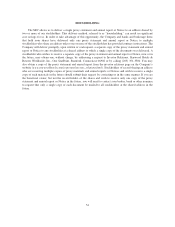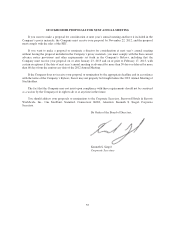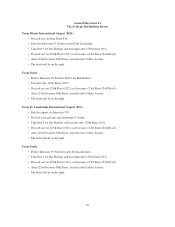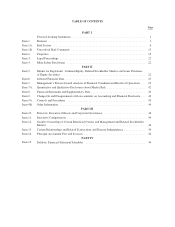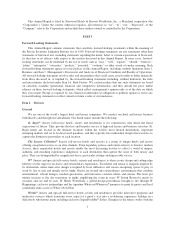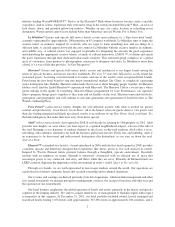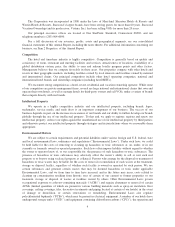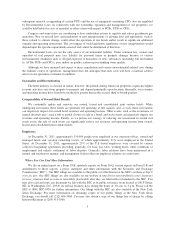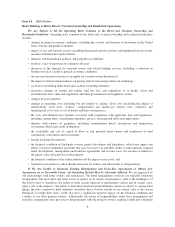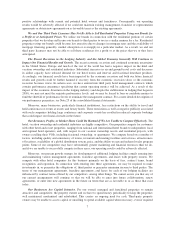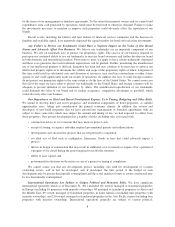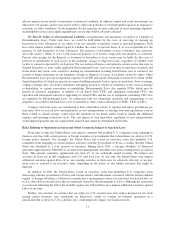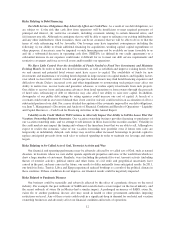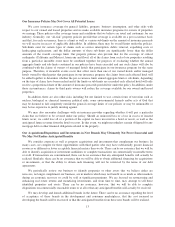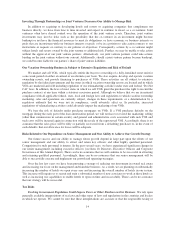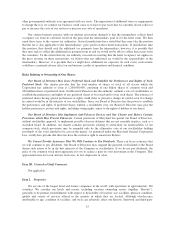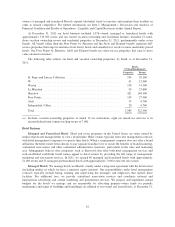Starwood 2011 Annual Report Download - page 74
Download and view the complete annual report
Please find page 74 of the 2011 Starwood annual report below. You can navigate through the pages in the report by either clicking on the pages listed below, or by using the keyword search tool below to find specific information within the annual report.Item 1A. Risk Factors.
Risks Relating to Hotel, Resort, Vacation Ownership and Residential Operations
We Are Subject to All the Operating Risks Common to the Hotel and Vacation Ownership and
Residential Industries. Operating risks common to the hotel and vacation ownership and residential industries
include:
• changes in general economic conditions, including the severity and duration of downturns in the United
States, Europe and global economies;
• impact of war and terrorist activity (including threatened terrorist activity) and heightened travel security
measures instituted in response thereto;
• domestic and international political and geopolitical conditions;
• travelers’ fears of exposures to contagious diseases;
• decreases in the demand for transient rooms and related lodging services, including a reduction in
business travel as a result of general economic conditions;
• decreases in demand or increases in supply for vacation ownership interests;
• the impact of internet intermediaries on pricing and our increasing reliance on technology;
• cyclical over-building in the hotel and vacation ownership industries;
• restrictive changes in zoning and similar land use laws and regulations or in health, safety and
environmental laws, rules and regulations and other governmental and regulatory action;
• changes in travel patterns;
• changes in operating costs including, but not limited to, energy, labor costs (including the impact of
unionization), food costs, workers’ compensation and health-care related costs, insurance and
unanticipated costs such as acts of nature and their consequences;
• the costs and administrative burdens associated with compliance with applicable laws and regulations,
including, among others, franchising, timeshare, privacy, licensing and labor and employment;
• disputes with owners of properties, including condominium hotels, franchisees and homeowner
associations which may result in litigation;
• the availability and cost of capital to allow us and potential hotel owners and franchisees to fund
construction, renovations and investments;
• foreign exchange fluctuations;
• the financial condition of third-party owners, project developers and franchisees, which may impact our
ability to recover indemnity payments that may be owed to us and their ability to fund amounts required
under development, management and franchise agreements and in most cases our recourse is limited to
the equity value said party has in the property;
• the financial condition of the airline industry and the impact on air travel; and
• regulation or taxation of carbon dioxide emissions by airlines and other forms of transportation.
If We Are Unable to Maintain Existing Management and Franchise Agreements or Obtain New
Agreements on as Favorable Terms, our Operating Results May be Adversely Affected. We are impacted by
our relationships with hotel owners and franchisees. Our hotel management contracts are typically long-term
arrangements, but most allow the hotel owner to replace us in certain circumstances, such as the bankruptcy of
the hotel owner or franchisee, the failure to meet certain financial or performance criteria and in certain cases,
upon a sale of the property. Our ability to meet these financial and performance criteria is subject to, among other
things, the risks common to hotel industries described above. Factors outside of our control, such as the current
European sovereign debt crisis, could also have a significant negative impact on the financial condition and
viability of our hotel property owners. Additionally, the nature of responsibilities under these management and
franchise arrangements may give rise to disagreements with the property owners, making it difficult to maintain
6


